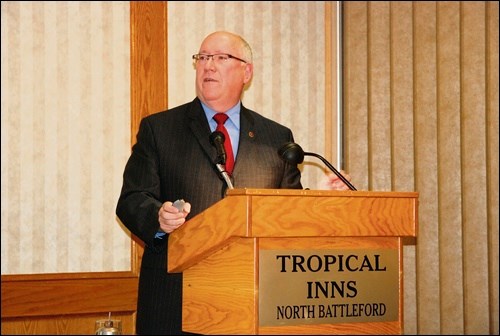Saskatchewan's efforts in promoting international trade was top of the minds of Rotary members at their luncheon Monday.
Lionel LaBelle, president and CEO of the Saskatchewan Trade and Export Partnership, spoke to the noon gathering at the Tropical Inn about international trade and the efforts of STEP to promote Saskatchewan trade around the world.
STEP is a standalone, non-profit organization with a mandate to increase Saskatchewan's exports to existing and new markets around the world. It is a non-profit membership-based organization.
At the Rotary luncheon, LaBelle spoke of the tremendous growth in Saskatchewan trade around the world, and spoke of a growing market for Saskatchewan products from North Africa all the way to China.
He talked about the organization's efforts in the rapidly-developing south Asian markets of India and Bangladesh.
Those were two of the countries where STEP took its trade mission last year, following on the heels of their successful trade mission to China. In making the pitch to Premier Brad Wall about why they were including Bangladesh, LaBelle noted, "we do more business in Bangladesh than we do in any country in continental Europe."
The STEP trade mission in March, 2011 went to several major cities including Mubai, Delhi and other cities in India, Dhaka in Bangladesh, as well as Colombo, Sri Lanka.
Premier Wall was part of that trade mission, which LaBelle said included 41 companies, three post-secondary institutions, five associations, and four research organizations.
Three trade missions were going on at the same time, he said. One was a trade mission for the pulse industry, one was a Premier's mission and the third was multi-sectoral.
In those countries the organization would hire in-country consultants to help link up Saskatchewan companies in expanding business opportunities there.
LaBelle spoke of renting out ballrooms in those countries for business relationship building events and compared the process to speed dating, but said everyone was moving in constant cycles and "believe me folks, it works."
LaBelle also spoke of STEP's efforts at the Agritechnica trade show in Hanover, Germany, a massive trade show for agricultural machinery.
The event hosted 27 buildings with a total of 419,000 visitors attending, said LaBelle. "Everybody in the world who knew anything about agricultural machinery was there."
It was held last November and LaBelle said STEP had a big presence at the event, with a big pavilion complete with Canadian and Saskatchewan flags as well as RCMP officers in their dress regalia. In all 24 companies and 88 individuals went to that event from Saskatchewan, said LaBelle.
The impressive Saskatchewan display was 1,200 metres in total and came in at a budget of $750,000. LaBelle described the event as one where "if you're going to be shy, go home."
The importance of these trade missions was stressed early on in LaBelle's presentation. He said that even in the Internet age, it's his experience that the "first transaction never happens over the Internet" - it is always about relationship building and it usually happens over a period of time.
"It's usually face to face, the first transaction," said LaBelle.
LaBelle also presented statistics and data illustrating where Saskatchewan's international trade is going around the world. This was all possible despite a much smaller expenditure on international trade efforts by Saskatchewan compared to what Alberta and British Columbia was doing, he pointed out.
In speaking to reporters LaBelle touted what he called a strong 15-year run in trade exports and anticipates continued growth throughout the world.
"Obviously we're strong in the food sector, we're strong in the energy sector, we're very strong in the manufacturing sector," said LaBelle.
LaBelle also talked about strength in the mining sector and in the potash sector, which is bouncing back from a bad year in 2009.
He said growth in trade in India and Bangladesh is tied to Saskatchewan's efforts to open up new markets and developing products to meet the need there, such as pulse products.
He remains enthusiastic about continued opportunities for international trade for Saskatchewan.
"We are feeling very strong, very bullish about global markets."




